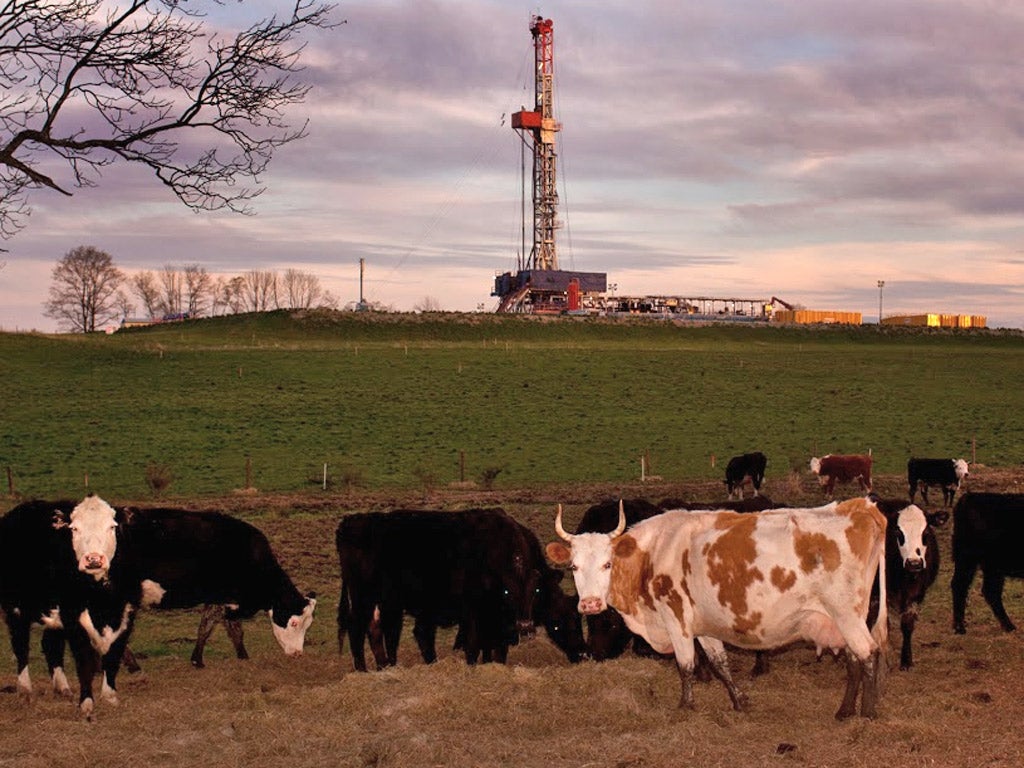Fracking sparks food safety concern as expert warns of serious risk to livestock
Professor Robert Oswald says his findings of deaths and deformities in American livestock are so alarming that Britain should halt the practice ‘until its impact is assessed’

Your support helps us to tell the story
From reproductive rights to climate change to Big Tech, The Independent is on the ground when the story is developing. Whether it's investigating the financials of Elon Musk's pro-Trump PAC or producing our latest documentary, 'The A Word', which shines a light on the American women fighting for reproductive rights, we know how important it is to parse out the facts from the messaging.
At such a critical moment in US history, we need reporters on the ground. Your donation allows us to keep sending journalists to speak to both sides of the story.
The Independent is trusted by Americans across the entire political spectrum. And unlike many other quality news outlets, we choose not to lock Americans out of our reporting and analysis with paywalls. We believe quality journalism should be available to everyone, paid for by those who can afford it.
Your support makes all the difference.Fracking for gas and oil in the British countryside poses such a significant risk to livestock that a moratorium should be imposed on the industry until its impact on food safety can be assessed, a leading researcher has warned.
Professor Robert Oswald, co-author of the first study into links between hydraulic fracturing and sickness in farm animals, said his findings of deaths and deformities in American livestock are so alarming that Britain should halt growth of the practice while further research is conducted.
The stark warning comes as planners prepare to consider applications to expand exploratory drilling operations around Sussex, a prime dairy farming area.
Professor Oswald, an expert on molecular medicine at Cornell University, compiled 24 incidents across six US states where livestock on farms adjacent to drilling sites died or suffered illness including reproductive and neurological problems potentially following exposure to fracking chemicals.
While proponents of fracking have pointed to its possible advantages including making Britain less reliant on gas imports, opponents have highlighted incidents of pollution affecting groundwater in America.
Among the incidents investigated by Professor Oswald and a colleague was a leak in Louisiana of waste water from fracking – the process to force gas from rock by blasting it with a chemical fluid – which allegedly left 17 cows dead from respiratory failure. In Pennsylvania, a herd suffered a 50 per cent stillbirth rate after cows grazed in a field contaminated with chemicals spilling from a waste pit.
Professor Oswald told The Ecologist: “[British] farmers living in intensively drilled areas should be very concerned about potential exposures of their crops and herds to shale-gas contaminants in the water, air and soil.”
The scientist said that all fracking should be halted in Britain until a testing programme is put in place to assess the impact on farmland, livestock and food supplies of the chemical cocktail used to force gas and oil from shale deposits. Campaigners have said an array of chemicals, including carcinogens, is deployed during fracking. Unlike in the US, British operators must release details of the chemicals they use.
Professor Oswald said: “Farmers have a right to know what their families and their herds are being exposed to. The components of fracturing fluids and drilling muds to be used in a well near a farm should be reported.”
He added: “We are reporting short-term health changes but no one knows what the long-term health changes may be, especially those caused by low doses of chemicals.”
The debate on fracking in Britain has yet to consider any potential impact on food production, with protesters focusing on environmental pollution and possible damage to property.
Farmers in Northern Ireland, where energy firms are also hoping to start drilling, highlighted their opposition with a protest at this summer’s G8 conference. John Sheridan, a farmer and official with the Ulster Farmers’ Union, said: “The food and drink industry is worth close to €30 bn in Ireland and fracking could ruin that industry.”
The Department for Environment, Food and Rural Affairs said last night it was not aware of significant animal welfare concerns related to fracking but it kept the issue under review.
Join our commenting forum
Join thought-provoking conversations, follow other Independent readers and see their replies
Comments